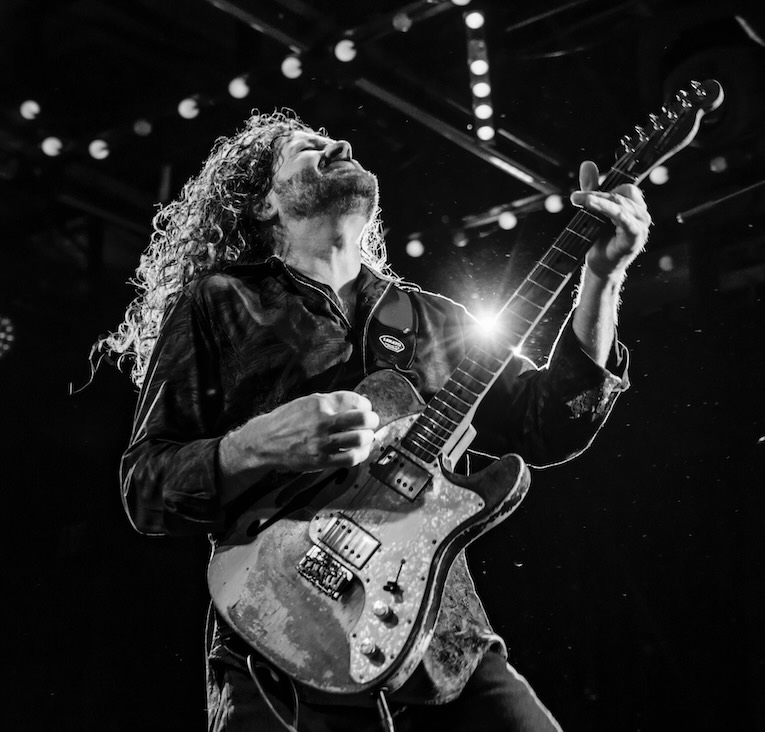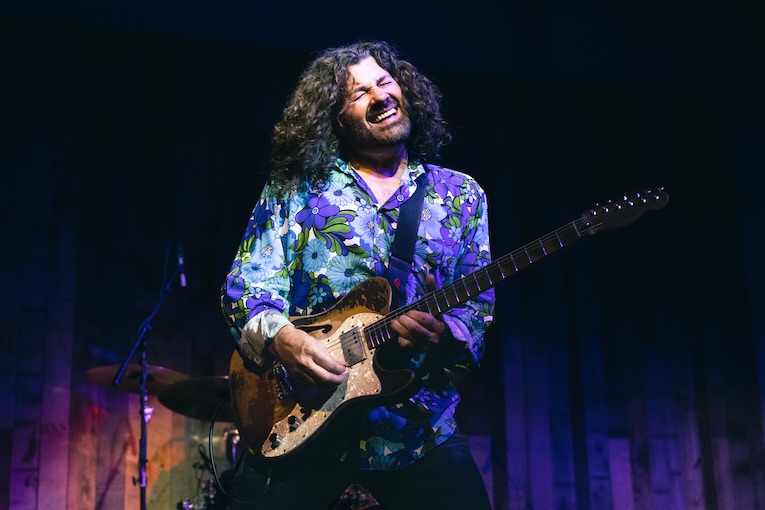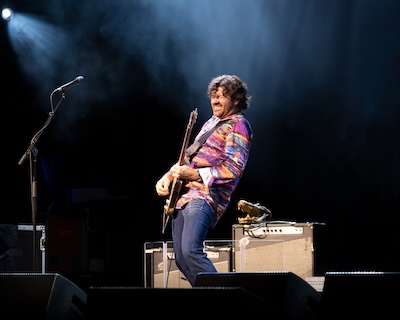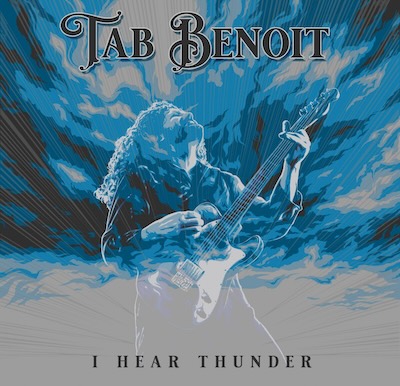
Photo: Jean Frank
Tab Benoit Interview
By Martine Ehrenclou
Legendary blues guitarist, singer, songwriter and record producer Tab Benoit is set to release his first solo album in 13 years. I Hear Thunder is out August 30th via his own imprint Whiskey Bayou Records. The album features 10 compelling tracks and musicians Anders Osborne and George Porter Jr (The Meters.) His last album, Medicine, released in 2014 and co-produced by Anders Osborne for Concord International, won three Blues Music Awards. Following this notable success, Benoit took a 13-year sabbatical from recording, entering a period of creative exile.
A four-time Grammy Award nominee, Tab Benoit, is one of the most influential blues artists today and one of the most beloved. Known for his world class guitar chops and distinctive guitar tone, his voice is often compared to Otis Redding.
Benoit is a two-time BB King Entertainer of the Year Award winner by the Blues Music Awards, winner of two additional BMAs, and was inducted into the Louisiana Music Hall of Fame. He’s known for his live shows which are filled with fiery guitar playing and singing, and plenty of humor and storytelling. Building his career on a foundation of gritty and soulful Delta blues, Benoit was born and raised in Houma, Louisiana. As a dedicated environmental advocate for the Louisiana Wetlands, he is the founder and driving force behind the non-profit organization Voice of The Wetlands.
I caught up with Tab Benoit by phone from his home in Louisiana.
Martine Ehrenclou
The big question everyone is asking is, why did it take so long for you to put out another solo album? It’s been 13 years.
Tab Benoit
The biggest reason is I was finally free to do an album without giving it to a record label. I was still stuck in in my first record deal that I ever signed. I didn’t want to give any more music away to a sour deal that I signed when I was in my early 20s without a lawyer. I signed a bad deal. And I was stuck in that. I’m 56 years old. I just got out of it. I don’t have any control over any of my previous albums. I have no say so over what happens with it. I can’t reproduce it. I can’t put it on vinyl.
Martine
Wow. That’s awful. I had no idea. I’m sure that’s a common story with young artists.
Tab
Oh, yeah. It’s the same old thing, but they let me out, so that was a good thing for me as far as not having to deliver. Because I still owed them albums. I could not bring myself to do that again and give myself and something that’s so personal between me and my audience and having this middle entity in between—and the audience doesn’t understand. They don’t know. They’re just looking at me like, “Hey, why don’t you put out something?”
I just didn’t want them (record label) coming after me and saying, “Why are you doing these interviews and talking about us like that?” I mean, they could have sued me at any time to force me to release an album. They let me out. So, then I’m free to come back and say, “Hey, (laughs) I’m still around.” I mean I’ve been playing live the whole time. I didn’t need to put out an album every year. I think I needed to stop putting out albums and really concentrate on playing live and figuring out how to play those songs. I was just throwing albums out there because I had to. Now I can do it because I want to. (Laughs) It’s I different vibe.
Martine
That’s awesome. How was it different approaching your new album I Hear Thunder? Did you have a renewed sense of creativity or enthusiasm?
Tab
Yeah, in a lot of ways. I had some of the material started, maybe a couple were over 10 years ago. One of the songs I did with George Porter– “Little Queenie.” We wrote it at my fishing camp, and that camp’s been gone for six, seven years now. A storm took it. And there was a couple of songs that I had written myself, just jotting things down or something came to mind when I was working on studio gear, and I needed something to record. I don’t write hundreds of songs and then pick the best 10 or the best 12. I write when it’s time to. And I don’t really have that much control over that. It’s going to just come out when it needs to come out. I’m not really trying to, there’s no real idea of, “I want to make a song that sounds like this,” or “I want to make a song that says that.” It just comes out naturally. I think that’s the best way for me because I don’t want to do contrived songs that you make up, that’s not me. They have to be natural or I’m not going to do it.

Photo: Allison Morgan
Martine
Each song on I Hear Thunder is authentic and personal, or just plain fun. A favorite of mine is “Overdue.” It’s beautiful and your vocals and guitar solo are so soulful. I was following the story of the song. At the end, it sounded like a breakup song, but then you sang about working it out. Was it a love song?
Tab
(Laughs) It’s a song to my longtime fans that have been following me for so long, been waiting for this album. (Laughs) That’s what it’s talking about. It was the best way for me to say to my audience, “Hey, it’s okay. I’m sorry, but we’ve got to go through our things and it’s here. Here it is. I know it’s overdue.” And I thought that people would gather it up like that and understand that “this is for you.” This is me giving myself to you 100%. It wasn’t like I was trying to hold back. There were other things involved.
Martine
Tell me about “I Hear Thunder.” It’s such a killer song. You, Anders Osborne and George Porter Jr. wrote it.
Tab
We went out on my boat at my camp. When I write, that’s where I go. I go out into a swamp and park there and let the songs just come to us, and come to me.
Martine
Do you bring your acoustic guitar out on the boat too?
Tab
Oh yeah. Me and George and Anders went out there for a couple of days to my camp and brought our guitars and tied up to a cypress tree in the swamp. And then as soon as we tie it up, there was thunder off in the distance. (Laughs) One of them says, “I hear thunder,” and I pick up the guitar and (singing) “I hear thunder.” That’s just how it starts.
Martine
(Laughter) So, nothing deeper? I heard pain in there too.
Tab
That’s just how it starts. Something kicks it off, but there’s always going to be metaphorical things that are happening with real life. So, everything can have more than one meaning just like “Overdue” or any song. To me, it’s important to write a song that can be personal, but it still has to be open enough to where anybody can place themselves in it and it makes sense to them and their life in some way, shape or form. It still has to be somewhat universal. I think any writer wants the audience to see it for themselves. That’s why a lot of writers don’t like their movies being made from the books that they write because it takes the audience member or the fan out of making their own impression and getting their own visuals from it. I think (music) videos kind of ruin the songs. When MTV came around, they were forcing you to see the visual that they came up with for that song instead of you making up your own visual.
Martine
I see what you’re saying. Tell me about that connection with the audience because you certainly seem to have it.
Tab
That’s all I’ve had this whole time. I’ve always thought of myself as a live artist, not a recording artist. My albums are more or less just a snapshot of me at this time in my life, and here’s some new material to play with, but really, it’s just to introduce a song so that I can play them live. And when we play live, they get rewritten every time we play them. It’s always been a live experience. And live, it takes the middleman out of it. It takes the record label and the business out of it. It’s just me and the band and the audience. What I love about music more than anything is playing and that communication that we have live with the audience.
Martine
What is it exactly between you and the audience?
Tab
It’s a heart-to-heart conversation. That’s the one thing that music allows–a direct connection to your heart without any interference. There’s a lot of love there between me and my audience. I have people that have been coming to see me for over 30 years and they still come to every show when I’m in their area, they don’t miss. And they’ve become my friends over the years.
I always felt like I was building a friend base, not a fan base. So, when I get out on the road, and I’ve been hitting the road over 200 days a year for the last 36 years, I’m not out here because I’m going sightseeing. I’m not out here to travel the world and see the world. I’m out here to help people get through life, and they’re also helping me get through life. There’s something there that’s deeper than just a show. I almost feel like it’s more of a revival than a show. Because I’m not really putting on a show. I don’t rehearse anything.

Photo: Allison Morgan
Martine
No set list?
Tab
No, there’s nothing planned at all. I’ve always taken requests from the audience and we talk back and forth. It’s always been open to the moments. And I don’t want anything interfering with that. And neither does the audience. I think that’s what they’re coming for. They’re coming for that spontaneous feeling that we’re going to get together. And I’m not going to stop it. I’m going to allow it to continue. Every show is a special thing in and of itself. And it can’t be reproduced. Everybody in that room is involved. And all the artists that I used to go see, I would always go see the bands that made me feel like I was part of the show.
Albert Collins was great at that and BB King and Buddy Guy, and it seemed like just all of the real blues guys were the ones that didn’t have a set list, didn’t have a setlist. They were going to allow the moment to be a part of the show, and they’re going to let you feel that and let you feel like you’re part of it, you know?
Martine
Is music healing for you and your audience?
Tab
Yeah, we help each other. Music is the healer of the soul. It’s the only real medicine for your soul that works every time. It’s that important to me. For me to leave my house, it has to be that important. I don’t want to leave home. I like being home. Like I said, I’m not this world traveler out there trying to see the world and go sightseeing. I’m out here to help. And that’s what fulfills me, knowing that I’ve helped others. And I think that’s the most rewarding thing in life, is helping others to get through whatever we have to get through. It’s the only thing in my life that is rewarding enough to make me go out and do this for this long and continue to do it this hard for this long. (Laughter)
As tiring as it may seem, there’s always energy behind it because I know that it’s working. I always talk to people after the shows, I’ve always done that. I’m going around the country and I’m visiting my friends. (Laughter) They come and they tell me what’s going on in their area and what’s going on in their lives and vice versa.
Martine
That’s very cool.
Tab
It’s a beautiful thing. It’s a family.
Martine
When you’re not performing, does songwriting have some of the same healing aspects to it?
Tab
Oh, yeah. I try to do things very quickly as far as songwriting in particular. If it doesn’t happen easily, I just drop it. I don’t want to force anything or try to come up with something clever. It’s gonna happen fast because it’s all about a natural feeling, what I feel right now.
Martine
You’re a first-take kind of guy?
Tab
Well, the songs on the album are first takes. On that album, there’s no overdubs. There’s no fixing. The solos and the voice and the band. We’re all playing together. What we played, is exactly what you hear. And you’ll notice, there’s little slurs and little mess-ups that people would normally go fix.
But you strip the life out of the music when you take that out of it. When I listen to it, of course I wish I could have done some things better. But that’s normal for an artist to go, “I know I could do it better.” And you should feel like that. That’s what makes you try to do it better the next time. But you ain’t doing it better this time. This time is over. And that was the moment. And we capture moments. It’s not about trying to make some great production that I can never go reproduce live.
That’s one thing about me. I’m not going to record anything that I can’t go reproduce live. So, I’m not going to go make some big album that’s got all this great production on it and then I can’t go play it live because there’s no way to reproduce it because the production is too far out there. Or having to use backing tracks or more musicians. I need to be able a reproduce that live as a trio. So, that’s always the way I look at things when I’m going to write songs or I’m going to record songs. It’s not going to be anything that I can’t go do every day in front of the audience.
Martine
I think that rawness is part of what’s so appealing about your music. It feels like there’s an honesty or authenticity about it.
Tab
Exactly. That’s what’s missing in music today. And I can’t believe how people in the blues world are using all of the digital tools that we have–it’s like everybody’s using Auto-Tune just because it’s become a norm now, even if you don’t need it. If you went and Auto-Tuned Otis Redding, it would ruin the song. If you went and Auto-Tuned Ray Charles, it would ruin the song. It wouldn’t even work. It’s expression of the moment and the feeling that you’re having in that moment. And anything that you try to use to manipulate that or polish it or clean it up, you strip that moment away. Because now it’s not the moment, now it’s the computer’s moment.
It’s aggravating to me because I don’t trust anybody’s albums. Every time I hear something new, it’s been manipulated. I’m a studio engineer also. I know the tricks. I know what you can do in the studio with Pro Tools and the digital tricks. I know what can be done. When I hear that it strips the life out of it for me.
All the blues guys that I grew up listening to, they didn’t have any of that. They just played. I was talking to Roy Rogers who was producing John Lee Hooker’s later stuff, and he’s like, “Man, we had to have everything in the studio set up and ready to go, and the tape loaded in the machine and everybody in place, and then bring John Lee Hooker in, sit him down and then press start, press record, and then give him the guitar.” Because once they give him the guitar, he’s going. And he’s going to do it once. He ain’t going back and do it again.
I always felt that was the best way to capture it anyway. I do the same thing. We’re going to play this and we’re going to play it once, so let’s do it now. It’s the same thing that we do every day live. That’s what I said about me being a live artist. I play every night live and we don’t stop in the middle of it and go, “Oh, we messed that up. Let’s start over.” (Laughter) Or you don’t play a song and go, “Oh, we could do it better than that. Let’s do it again.” You don’t do that live. So why I do it in the studio?
Martine
I hear you. It takes the magic out of it. There something about the magic of the moment that’s pure for you.
Tab
That’s what it is. That’s a whole thing. That’s what I’m doing it for. I’m doing it for that reason. And some of that probably stems from doing stand-up comedy. I learned a lot about doing standup because I did standup the same way. I improvised everything and I basically just got there and told stories. And I still do it on my shows.
Martine
That takes a lot of confidence, don’t you think?
Tab
I don’t know. I started doing that when I was 17 years old when I was going to college.
Martine
When you started doing standup?
Tab
(Laughter) Yeah, I wasn’t really worried. It was like something I could do for fun and I was making money on it. I was like, “All right, cool.” I’m going to college, and you can drink free and make some money and all you’ve got to do is walk up there for 15, 20 minutes and tell stories. I was like, “Wow, okay.” (Laughter)
Martine
(Laughter) Were you playing guitar and singing then?
Tab
Yeah, but I wasn’t using it in comedy. The comedy was pure standup because back then if you walked in there and you brought an instrument, that was like cheating. The other comedians would look down on you. They’d say, “Oh man, you’re not doing standup. You’re not doing pure standup.” But I enjoyed the pure standup because it’s putting it all on you. The whole damn place is hanging on you. That’s what feels the most natural to me. If I have to rehearse something, if I ever have to rehearse it and try to reproduce it perfectly every time, that would drive me crazy. I don’t know if I could do that.
Martine
(Laughter) It would kill the spontaneity probably.
Tab
It would kill everything. I don’t know how I could inject any heartfelt feeling into that. Because when you’re forced to have to remember everything perfectly, then you’re playing from your head. You’re not playing from your heart.

Martine
Back to I Hear Thunder, do you have a favorite song on the album?
Tab
Every one of them has got its own story that’s important to me and to whoever was involved in that story. There’s a lot of laughing between me Anders and George Porter– we love hanging out together. They love coming to my camp and going out on the bayou and getting away from the other people and getting out into the swamp. When we get out there, there’s a lot of laughing going on. And you could tell in some of these songs, there’s definitely some humor in it.
Martine
Definitely. Your song, “Watching the Gators Roll In.”
Tab
That song in particular–we pulled up and parked and tied up to the tree and there was a little alligator that came to check us out. And I pulled a guitar out. I said, “Watch this.” And I start playing. And he comes closer to the boat, and now he’s just swimming in the current, staying right there next to the boat. Anders picks up his guitar, George picks up his bass, we start playing to it. We start writing a song with the alligator with us. He stayed the whole time and he was writing a song with us. He was almost like he knew we were writing a song for him. I’m singing it to him. (Laughter)
Martine
(Laughter) Do you think he was enjoying the music?
Tab
Oh yeah. He had a smile on his face and everything. (Laughs) If you spend enough time with alligators, you could tell. He definitely looked like he was enjoying every minute. (Laughter) You could tell he was loving it. He wasn’t going nowhere. Just sitting right there by the boat, listening to us, swimming in the current. We wrote the song with the alligator (laughter). And I’d give him a songwriting credit, but I don’t know where to send the royalty to. (Laughter)
Pre-order the album Here
“I Hear Thunder”
Tab Benoit website

Love this interview with one of my favorite artists! Tab’s stories made me want to ride out with him and Anders and George to his camp and listen to them tell stories and play! They all seem to play for the joy of it! Absolutely loved the story about writing the song for the alligator! This album is definitely on my “to buy” list!
What a great interview! I’ve always had an appreciation for Tab’s work. He can rock your pants off and that’s not easy to do.
No matter what song Tabbplays it’s always pure and real. It gets to you emotionally. I give myself up to his music. Close my eyes and absorb it even further.
Great article! Tab don’t know me from Adam, but he has been a friend of mine for a long time. This article reaffirms his authenticity for me. Take it as it comes or leave it behind. Thanks Tab! See you on the cruise.
Great interview. Love his music but sadly will never get to see him as I live in South Africa
OM so interesting to know about the man behind those eyes. His voice and songs with his awesome guitar playing is no other than a making of this beautiful blues artist and we all are so lucky to have him around playing live shows that we can listen or get up and dance. I felt lucky to even meet Tab a few times at BBB you are so friendly and a kind person to want to talk with your fans. Thank you again for your love, passion and soul for the music we enjoy so much. Many cheers out to you hugs, Gigi
Just standard American Blues/Rick music